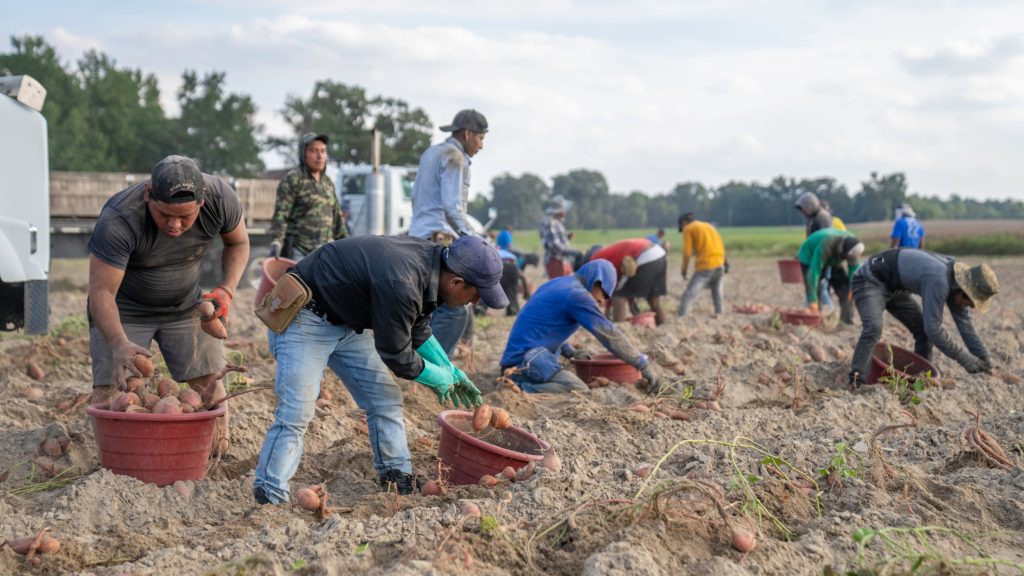Agricultural farmworkers make up about 1% of the workforce, providing about 2.6 million jobs. Of these workers, twenty percent have a family income below the poverty level, according to the 2017-2018 National Agricultural Workers Survey. In addition to wage concerns, in many states employers are not required to provide worker’s compensation, and only around thirty percent of agricultural workers report that their employers provide them health insurance. Also, the benefits that agricultural workers are eligible for vary from state to state, leading to systems that are confusing and difficult to navigate. This is the fourth in a series of periodic highlights of new and existing NALC resources that are relevant for BIPOC (Black, Indigenous, People of Color) and other underserved communities. Relevant current events and blog posts relating to these communities are available here. This post will focus on agricultural workers.
Hazardous conditions that agricultural workers may be exposed to include pesticide residue, heat stress, or access to clean drinking water. The Migrant and Seasonal Agricultural Worker Protection Act (“MSPA”) is one of the main labor laws protecting agricultural workers and creates employment standards related to wages, housing, transportation, disclosures, and recordkeeping. For example, the MSPA requires employers to post information about worker protections at every worksite. The MSPA also requires that when an employer provides housing, it meets all state and federal health and safety standards. For more information about the MSPA and other laws that apply to agricultural labor, click here.
H-2A Workers
H-2A agricultural guest workers (“H-2A workers”) are in the United States as part of a visa program for short-term agricultural labor contracts, and their numbers continue to grow. Between 2010-2019 there was an increase from about 79,000 to 258,000 H-2A workers. About 10% of workers in the United States are employed with H-2A visas.
The rights and protections that apply to H-2A workers are different from those of other agricultural workers. For example, H-2A workers are excluded from the MSPA. Because of this, H-2A workers cannot sue in federal court for lost wages, housing benefits, transportation reimbursement, and other requirements of their H-2A contract and instead must file complaints with their local Wage and Hour Division offices, who then take the appropriate action. The H-2A program does provide its own set of worker protections that are similar to that of the MSPA. This includes employers being required to provide a copy to the H-2A workers of their work contract and paying them at least twice a month. Additionally, employers have to provide free transportation to and from the job site and free housing. A noticeable difference from other agricultural worker protections is that the H-2A program requires that employers provide workers compensation for H-2A workers. So while the MSPA does not protect H-2A workers, there are various other laws that might cover them, such as the Fair Labor Standards Act and the Family and Medical Leave Act.
Resources
The NALC and our partners have resources related to issues faced by agricultural workers. For example, the Ag Law in the Field podcast hosted by NALC partner Tiffany Dowell Lashmet with Texas A&M AgriLife Extension Service has released several episodes and published several resources on agricultural law topics related to labor and immigration. Past highlights include:
- Impact of COVID-19 on H-2A Program & Labor Law
- H-2A Agricultural Guest Worker Program
- Immigration Law
The Center for Agricultural and Shale Law (“CASL”), another partner, has published a resource that discusses the Fair Labor Standards Act as it relates to agriculture, found here. They also created the Pennsylvania Farm Employers’ Listserv (“PFEL”) as a way to share labor issue related resources with farm employers. For more information on PFEL, and to sign-up, click here.
The Center for Agricultural Law and Taxation (“CALT”), a NALC partner, maintains a resource dedicated to the H-2A program, which can be accessed here.
Another one of the NALC’s partners, Farm Office, has several blog posts related to labor laws:
Along with our partners, NALC has also published several resources and hosted webinars on a variety of topics related to labor and immigration:
- DOL Proposes Changes for H-2A Wage Rates
- Department of Homeland Security Makes Changes to Immigration Enforcement
- Agricultural Labor: An Employer’s Obligations and Responsibilities (Springsteen, 2009)
- Ag Labor During Seedtime and Harvest within a Global Pandemic: What Agribusinesses Must Know and Do to Survive COVID-19 (Davis, Huff, & Williams, 2020)
